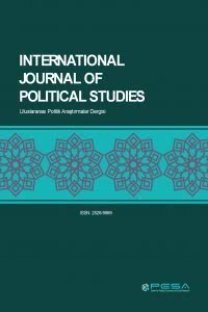Politikayı Yeniden Düşünmenin Bir İmkânı Olarak Jacques Rancière’de Politik Özneleşme
Jacques Rancière polis ile politika arasında kurduğu ayrım ile politikayı yeni bir bakış açısıyla okuma noktasında öne çıkan bir düşünürdür. Rancière, polis ile politika arasında bir ayrım yaparak buradan hareketle verili olan rol ve kimlikleri reddetmekte ve düalist ayrımların bir hiyerarşi kurmak suretiyle tahakküm kurucu özelliğini öne çıkarmaktadır. Rancière hem verili olduğu kabul edilen kimlik ve rollerin hem de buradan neşet eden ayrım ve hiyerarşilerin olumsal olduğunu göstermeye çalışmakta ve politik özneleşmeye bir alan açarak, politik düşüncenin yeni bir perspektiften okunmasını sağlamaktadır. Bu çalışmada, Rancière’in söz konusu polis ile politika arasında kurduğu ayrım ve bu ayrımdan hareketle politik özneleşme meselesi ele alınacak ve böylesi bir politik özneleşme deneyiminin ise politik düşünceyi farklı bir açıdan anlama noktasında nasıl bir imkân sunduğu üzerinde durulacaktır.
Political Subjectivization in Jacques Rancière as a Possibility to Rethink Politics
Jacques Rancière is a prominent thinker in terms of reading politics from a new perspective, with the distinction he established between police and politics. Rancière makes a distinction between the police and politics, rejecting the roles and identities given from this point of view, and putting forward the dominance feature of dualist distinctions by establishing a hierarchy. However, Rancière tries to show that both the identities and roles that are accepted to be given, and the distinctions and hierarchies that arise from them are contingent, and opens a space for political subjectivization, allowing political thought to be read from a new perspective. In this study, Rancière's distinction between the police and politics and, based on this distinction, will deal with the issue of political subjectivization. It will be emphasized how such an experience of political subjectivation provides an opportunity to understand political thought from a different perspective.
Keywords:
Ranciere, politics, police, subjectivization, demos,
___
- Bingham, C. & Biesta, G. (2010), Jacques Rancière: Education, Truth, Emancipation, Continuum International Publishing, New York.
- Davis, O. (2010), Jacques Rancière, Polity Press, UK.
- Genel, K. (2016), “Jacques Rancière and Axel Honneth: Two Critical Approaches to the Political” Recognition or Disagreement; A Critical Encounter on the Politics of Freedom, Equality, and Identity. ed. Katia Genel & Jean-Philippe Deranty, Columbia University Press, New York.
- Herakleitos. (2005), Fragmanlar, çev. Cengiz Çakmak, Kabalcı Yayınları, İstanbul.
- May, T. (2010), Contemporary Political Movements and the Thought of J. Rancière, Edinburg University Press, UK.
- May, T. (2008), The Political Thought of Jacques Rancière, Edinburg University Press, UK.
- Mouffe, C. (2008) Siyasetin Dönüşü, çev. Fahri Bakırcı-Ali Çolak, Epos Yayınları, Ankara.
- Hewlett, N. (2018), Badiou, Balibar, Rancière; Özgürleşmeyi Yeniden Düşünmek, çev. H. İlksen Mavituna, Metropolis Yayınları, İstanbul.
- Kearney, R. (2012), Yabancılar, Tanrılar ve Canavarlar. çev. Barış Özkul, Metis Yayınları, İstanbul.
- Platon. (2011), “Gorgias”, Diyaloglar, çev. Teoman Aktürel, Remzi Kitabevi, İstanbul.
- Rancière, J. (2005), Uyuşmazlık: Politika ve Felsefe. çev. Hakkı Hünler, Ara-lık Yayınları, İzmir.
- Rancière, J. (2007), Siyasalın Kıyısında. çev. Aziz Ufuk Kılıç, Metis Yayınları, İstanbul.
- Rancière, J. (2008a), Filozof ve Yoksulları. çev. Aziz Ufuk Kılıç, Metis Yayınları, İstanbul.
- Rancière, J. (2008b), Görüntülerin Yazgısı, çev. Aziz Ufuk Kılıç, Versus Kitap, İstanbul.
- Rancière, J. (2010), Özgürleşen Seyirci. çev. E. Burak Şaman, Metis Yayınları, İstanbul.
- Rancière, J. (2011), “The Thinking of Dissensus”, Reading Rancière, ed. by Paul Bowman and Richard Stamp, Continuum International Publishing Group, USA.
- Rancière, J. (2012a), Estetiğin Huzursuzluğu. çev. Aziz Ufuk Kılıç, İletişim Yayınları, İstanbul.
- Rancière, J. (2012b), “Work, Identity, Subject”, Jacques Rancière and the Contemporary Scene, ed. Jean-Philippe Deranty & Alison Ross, Continuum International Publishing, New York.
- Rancière, J. (2015), Demokrasi Nefreti, çev. Utku Özmakas, İletişim Yayınları, İstanbul.
- Rancière J. & Honneth, A. (2016), “A Critical Discussion” Recognition or Disagreement; A Critical Encounter on the Politics of Freedom, Equality, and Identity ed. Katia Genel & Jean-Philippe Deranty, Columbia University Press, New York.
- Rancière, J. (2016), “Critical Questions on The Theory of Recognition”, Recognition or Disagreement; A Critical Encounter on The Politics of Freedom, Equality, and Identity ed. Katia Genel & Jean-Philippe Deranty, Columbia University Press, New York.
- Tanke, J. J. (2011), Jacques Rancière: An Introduction, Continuum International Publishing, New York. Vattimo, G. – Zabala, S. (2012) Hermeneutik ve Komünizm; Heidegger’den Marx’a, çev. Erhan Kuçlu, Monokl Yayınları, İstanbul.
- Başlangıç: 2015
- Yayıncı: Politik Ekonomik ve Sosyal Araştırmalar Merkezi
Sayıdaki Diğer Makaleler
Türkiye İşçi Partisi’nin İnşa ve Gelişimini Tetikleyen Koşullar (1960 – 1966)
Adil Düzen Kavramı Bağlamında Necmettin Erbakan’ın Dış Politika Anlayışı
Sivil Toplum Kuruluşlarının Afet Yönetimindeki Rolü: 6 Şubat Depremi Hatay Örneği
Politikayı Yeniden Düşünmenin Bir İmkânı Olarak Jacques Rancière’de Politik Özneleşme
